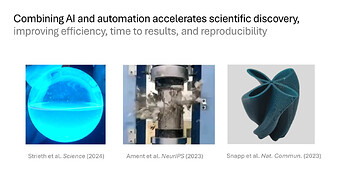A challenge in talking to funding agencies is justifying the efficacy of autonomous laboratories in scientific achievement. What are the most convincing and impressive examples of laboratory autonomy accelerating science or doing something that cannot be done via traditional experimentation? If we can create a “best of” portfolio for laboratory autonomy we can use it as a tool in talking to potential sponsors.
(1) I often bring up the “world’s brightest* molecule”
(*technically optimized cross-section gain at a specific wavelength, but this is the catchy phrase)
Felix Strieth-Kalthoff et al. Delocalized, asynchronous, closed-loop discovery of organic laser emitters. Science 384, eadk9227 (2024). DOI: 10.1126/science.adk9227
(2) I also often bring up Meta’s stronger, sustainable concrete discovery (Bayesian optimization, no automation)
Ament, Sebastian, et al. “Sustainable Concrete via Bayesian Optimization.” arXiv preprint arXiv:2310.18288 (2023).
(3) @kab’s “world’s best shock absorber geometry” examples, where I talk about how 25k experiments were run autonomously over the course of three years to find a world’s best.
Snapp, K.L., Verdier, B., Gongora, A.E. et al. Superlative mechanical energy absorbing efficiency discovered through self-driving lab-human partnership. Nat Commun 15, 4290 (2024). Superlative mechanical energy absorbing efficiency discovered through self-driving lab-human partnership | Nature Communications



